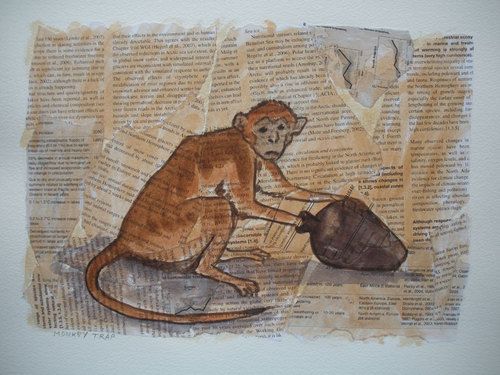Stewarding Your Treasure
BEN SANSBURN

THE MONKEY TRAP
There’s a legendary story about a village in Southern India that was being terrorized by a troop of small monkeys.
To catch the pests, the villagers came up with an ingenious plan. They took several hollowed out coconuts and chained them to a stake. Inside the coconuts they placed a small amount of rice that could be seen through a hole in the top. The hole was just large enough for a monkey to insert their out-stretched hand, but not large enough for them to remove a fist gripped around a ball of rice. Do you see where this is going?
The monkeys, pulled in by the delicious rice, would reach into the coconut and grab it. But consumed by their own greed, they were unable to let go and their desire to hold onto the rice made it impossible to pull out their hand. They were trapped. The very thing they were gripping had gripped them.
To catch the pests, the villagers came up with an ingenious plan. They took several hollowed out coconuts and chained them to a stake. Inside the coconuts they placed a small amount of rice that could be seen through a hole in the top. The hole was just large enough for a monkey to insert their out-stretched hand, but not large enough for them to remove a fist gripped around a ball of rice. Do you see where this is going?
The monkeys, pulled in by the delicious rice, would reach into the coconut and grab it. But consumed by their own greed, they were unable to let go and their desire to hold onto the rice made it impossible to pull out their hand. They were trapped. The very thing they were gripping had gripped them.

It’s not hard to see the connection between the village monkeys and us. When we cling to what we think is ‘ours’, we end up mastered by the very things we thought we were master over.
In his little book The Pursuit of God, AW Tozer highlights how our money and possessions can grab hold of us. In the chapter “The Blessedness of Possessing Nothing,” Tozer writes:
There can be no doubt that this possessive clinging to things is one of the most harmful habits in the life. Because it is so natural it is rarely recognized for the evil that it is; but its outworkings are tragic.
We are often hindered from giving up our treasures to the Lord out of fear for their safety…. But we need have no such fears. Our Lord came not to destroy but to save.
In his little book The Pursuit of God, AW Tozer highlights how our money and possessions can grab hold of us. In the chapter “The Blessedness of Possessing Nothing,” Tozer writes:
There can be no doubt that this possessive clinging to things is one of the most harmful habits in the life. Because it is so natural it is rarely recognized for the evil that it is; but its outworkings are tragic.
We are often hindered from giving up our treasures to the Lord out of fear for their safety…. But we need have no such fears. Our Lord came not to destroy but to save.
“Everything is safe which we commit to Him, and nothing is really safe which is not so committed.”
Tozer’s quote is profound. We so easily grab and protect and guard our treasure, and yet it’s when it’s gripped in our hands that our possessions, and we ourselves, are most vulnerable. For our good, God invites us to open our hands to him; not just with our treasure but with all of life.
Hear Tozer:
Our gifts and talents should also be turned over to Him. They should be recognized for what they are, God's loan to us, and should never be considered in any sense our own. We have no more right to claim credit for special abilities than for blue eyes or strong muscles. "For what do you have that you did not receive?"
This is our problem, ultimately. We see ourselves as owners, not stewards. But what do we do about it? This is where Tozer exhorts us. He helps us see the pathway for how to deal with what he calls our “possession malady”…
The Christian who is alive enough to know himself even slightly will recognize the symptoms of this possession malady, and will grieve to find them in his own heart. If the longing after God is strong enough within him he will want to do something about the matter. Now, what should he do?
First of all he should put away all defense and make no attempt to excuse himself either in his own eyes or before the Lord. Whoever defends himself will have himself for his defense, and he will have no other; but let him come defenseless before the Lord and he will have for his defender no less than God Himself. Let the inquiring Christian trample under foot every slippery trick of his deceitful heart and insist upon frank and open relations with the Lord.
Then he should remember that this is holy business. No careless or casual dealings will suffice…. Let him insist that God…. take things out of his heart and Himself reign there in power. It may be he will need to become specific, to name things and people [he is grasping] by their names one by one…..
If we would indeed know God in growing intimacy we must go this way of renunciation.
It’s in opening our hands that we find true freedom. Whether it’s our time, our talent, or our treasure, let’s together unclench our fists and be open-handed conduits of God’s goodness to the world around us.
Hear Tozer:
Our gifts and talents should also be turned over to Him. They should be recognized for what they are, God's loan to us, and should never be considered in any sense our own. We have no more right to claim credit for special abilities than for blue eyes or strong muscles. "For what do you have that you did not receive?"
This is our problem, ultimately. We see ourselves as owners, not stewards. But what do we do about it? This is where Tozer exhorts us. He helps us see the pathway for how to deal with what he calls our “possession malady”…
The Christian who is alive enough to know himself even slightly will recognize the symptoms of this possession malady, and will grieve to find them in his own heart. If the longing after God is strong enough within him he will want to do something about the matter. Now, what should he do?
First of all he should put away all defense and make no attempt to excuse himself either in his own eyes or before the Lord. Whoever defends himself will have himself for his defense, and he will have no other; but let him come defenseless before the Lord and he will have for his defender no less than God Himself. Let the inquiring Christian trample under foot every slippery trick of his deceitful heart and insist upon frank and open relations with the Lord.
Then he should remember that this is holy business. No careless or casual dealings will suffice…. Let him insist that God…. take things out of his heart and Himself reign there in power. It may be he will need to become specific, to name things and people [he is grasping] by their names one by one…..
If we would indeed know God in growing intimacy we must go this way of renunciation.
It’s in opening our hands that we find true freedom. Whether it’s our time, our talent, or our treasure, let’s together unclench our fists and be open-handed conduits of God’s goodness to the world around us.
The definition of a generous heart is someone who has such a joyous, assertive, proactive desire to seek out ways to give money away that you do it and do it and do it until it makes a measurable difference in the very way in which you’re able to live economically and not until then.
- Timothy Keller
Questions for Reflection:
- Read through 2 Corinthians 8-9 in one sitting. Write down all the reasons Paul highlights to encourage his readers toward generosity.
- Read through Jesus’ teaching on money and possessions in the Sermon on the Mount (Matthew 6:25-34). What motivations are driving how you manage your money? Do you have anxieties? Fears? Do you more naturally obsess about money or do what you can to avoid thinking about it? Prayerfully consider the reasons you approach money the way you do. What are your fears or anxieties regarding money? Bring those to the Lord confessing them and asking him to help you trust him.
- Read through Jesus’ interaction with the rich young ruler, and his teaching to his disciples in Mark 10:17-31. What do you think kept this young man from following Jesus? Are there ways that money and possessions are defining your identity? What are the things you are holding onto? How would letting go free God to possess areas of your heart in a deeper way?
- Do an intentional personal financial audit. If someone were to look at your spending and saving, what priorities would they see? What areas can you live more simply in order to increase your generosity? If you are married, spend some meaningful time with your spouse this week discussing and praying through how you are stewarding your treasure.
Prayer
God, we cling to money.
Our knuckles are white.
We don’t want to loosen our grip.
But we know it’s temporary
And that its value is so limited in comparison to who you are, with what you give.
Help us open our hands.
Show us Jesus, who though he was rich became poor.
Give us confidence in you, our eternal treasure.
That we might give as you gave. And love as you loved.
For your glory alone, Amen.
- Adapted from The Book of Giving, Pierce Taylor Hibbs
Our knuckles are white.
We don’t want to loosen our grip.
But we know it’s temporary
And that its value is so limited in comparison to who you are, with what you give.
Help us open our hands.
Show us Jesus, who though he was rich became poor.
Give us confidence in you, our eternal treasure.
That we might give as you gave. And love as you loved.
For your glory alone, Amen.
- Adapted from The Book of Giving, Pierce Taylor Hibbs

